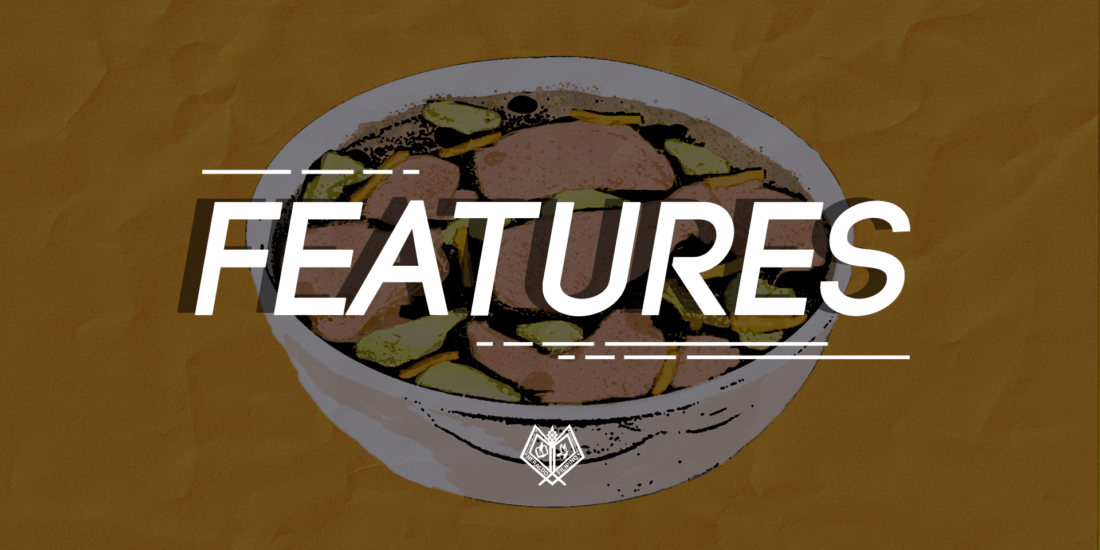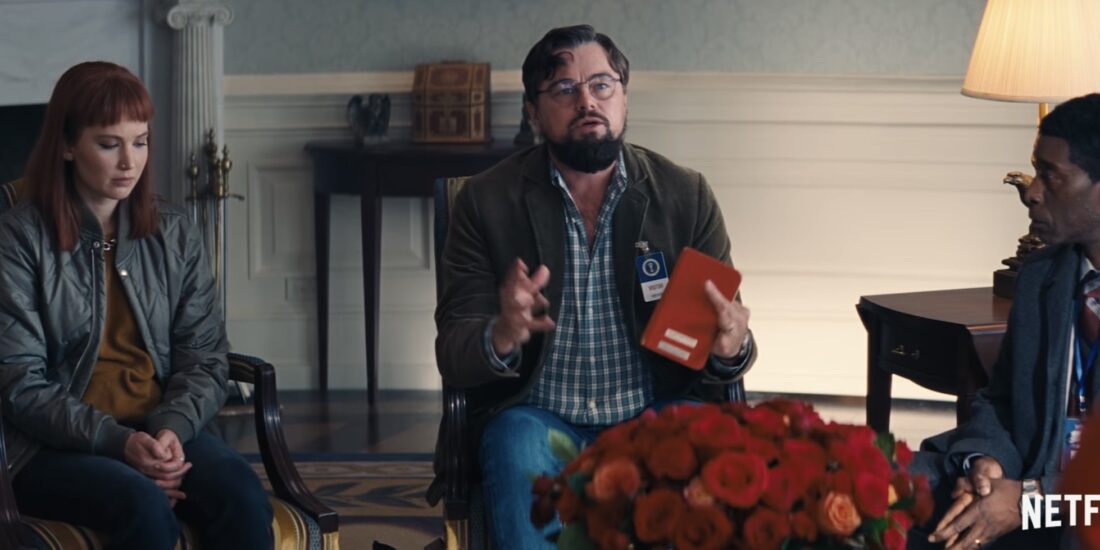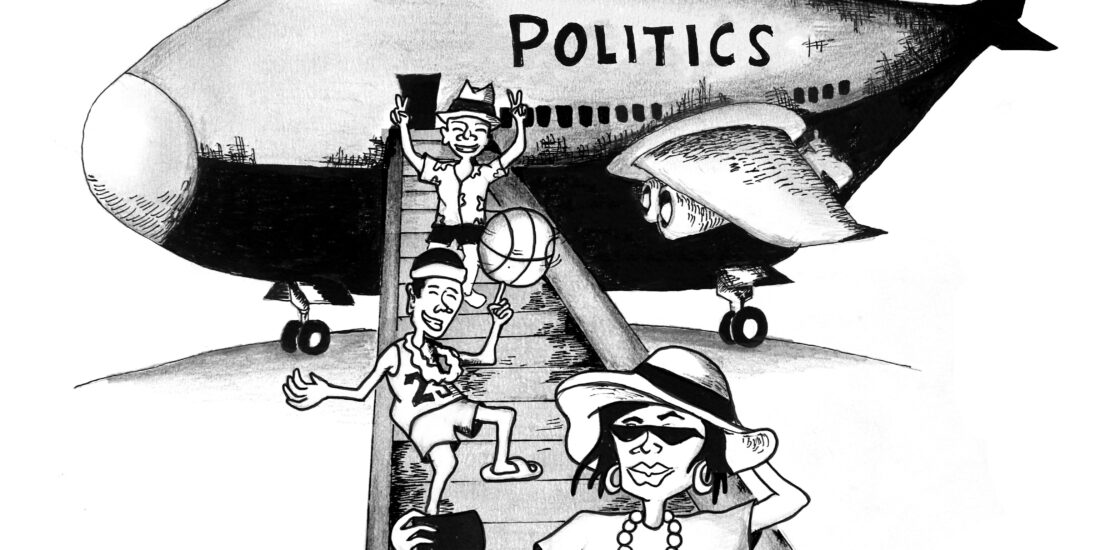The political shtick

Graphic Art by Camille Joy Gallardo
Picture yourself in a room surrounded by your closest friends (if you have any). It’s a Friday night, and the whole gang’s holed up in your house having a good time. “Have you heard this song yet?” “When’s the next game scheduled?” And then out of nowhere, someone goes ahead and asks the forbidden question, “What do you guys think about the government?”
Pin-drop silence. The music stops playing. The games are paused. The opinions then start gushing out, one after the other. Soon everyone’s gotten all riled-up preaching their beliefs, with the occasional suggestion of where the other party can shove theirs. You see yourself in the middle of Signal #4 brainstorming, with all the opinions thrashing and furniture flying, and you might ask yourself if the fun was worth killing for this madness. You can find the answer on your own as you proceed, and like the very fundamental rule of political discourse—remember to keep an open mind.
“Dude, where’s my political discourse?”
There’s no denying that our current administration, with its astounding amount of supporters, has garnered a lot of raised eyebrows and blunt criticism from people who either don’t prefer or downright disagree with the actions of our president and his camp. In light of that, clashes of contrasting opinions are bound to happen, and when it rains, it pours.
There are two ways to engage in a political debate. The first one being face-to-face, where you verbally get your point across (liquor may or may not be involved). The second is online, where you butt heads with other people on social media. With unlimited internet ammunition, you try to rain down a flurry of “bullets”—AKA facts—on each other. Either way is just as efficient, although you just have to be careful with counterproductive elements such as close-minded people and even online trolls. In an ideas.ted.com article called How to talk about politics constructively, the writer, Celeste Headlee encourages us to “begin to talk and, more importantly, listen to those who disagree with us.” So put down that steel chair and hear the other party out first.
With today’s society and technology, there are countless means and places to exchange perspectives with others. You just have to pick one, and engage.
The real weeds to cull
Although the lack of participation is an issue, the main problem of political discourse is the mindset of the masses. We’ve seen how sheer public opinion has molded this country’s recent history—it’s one of the powers of democracy, the “rule of the majority” that’s both wonderful and fearsome at the same time. From the first People Power Revolution to President Rodrigo Duterte’s landslide victory, the Filipino people were in the midst of it all.
However, public opinion might not necessarily equate to the truth. As Einstein once said, “What is right is not always popular and what is popular is not always right.” In Dr. Eva-Lotta E. Hedman’s paper entitled, The Politics of “Public Opinion” in the Philippines, she raises another cautionary argument, stating that politics of public opinion may only have limited transformative potential for democracy in our country. Case in point: Adolf Hitler—super popular at first. Look how that turned out.
One more hindrance to productive political discourse are—cue drum roll—online trolls. They’re abrasive, rude, and basically a total pain to deal with. Very much like those poorly informed, they will counter your facts with memes, plus satirical or downright fake articles. “Not true, you say? Edi wow. Clearly you don’t know what you’re talking about. Plus you’re what, 19? Too young to be lecturing me, so shut up ka nalang. Focus on your studies. Kaya ‘di umuunlad ang Pinas, eh.” They will get on your nerves as fast as a political FB post can heat up in the comments section. Wikipedia defines a troll as “a person who sows discord on the Internet by starting arguments or upsetting people,” and for once, Wikipedia hits the nail on the head. Whitney Phillips, a literature professor at Mercer University, portrays trolls as “mostly normal people who do things that seem fun at the time that have huge implications,” such as political debates turning sour due to personal attacks (which are totally uncalled for.) These aren’t often realized by the perpetrator because as far as they’re concerned, it’s just a bunch of text on a computer screen. Trolls are notoriously numerous in social media sites, so tread carefully.
Adding all these factors together plus a couple of encounters with ridiculously close-minded people, you may find political discourse exhausting. That’s a given, but if you can avoid getting caught up in their playing field, you can pull through all the negativity and move on to actual proper debates. Oh, and let them have this L.
To the matter at hand
When we see adults going out of their way to defend their respective opinions, we may end up wondering, “Where do I fit in all of this?” The answer to that is simple: we, the youth, are the key to real change. Or at least, we could be. COMELEC Chairman Andres Bautista said that during the 2010 elections, Filipinos aged 18-35 comprised about 37 percent of the entire electorate. He claimed that if 75 percent of the youth had voted for a candidate, a victory would have been all but guaranteed. Meanwhile, the 2016 registered voter polls estimate around 54-55 million voters, 20 million of whom are the youth. Yep, it starts with us.
In the cover story of Time magazine’s May 2013 issue, the article starts off with labelling us as narcissistic brats but despite our faults, we have what it takes to be the greatest generation anyway. According to journalist Joel Stein, “The Internet has democratized opportunity for many young people, giving them access and information that once belonged mostly to the wealthy.” A study by Dr. Jessica Lucia Beyer, Youth and the Generation of Political Consciousness Online, proved that young people are more politically engaged than much of literature on civic engagement suggests. The study also shows that the factors of the youth’s online political involvement include high levels of anonymity, low levels of formal regulation, and minimal access to small-group interaction. Now, if only we didn’t waste all that access and information by believing political memes, then something might just happen in our favor.
All things considered, the active participation of the youth in political discussions makes all the difference. We, who have all the resources we need, are possibly the best shot in turning things for the better in this nation. But no pressure.
***
Political discourse—it’s difficult, messy, and can destroy friendships more effectively than a deck of UNO cards. But no matter how many different beliefs are forced down your throat, one can’t deny that this kind of talk is productive and should be encouraged in a healthy manner. Deep involvement in political discourse can eventually prove to be a useful asset for us in the future, in spite of all the bashing and trolling we have to face first.
“Ano sa tingin niyo, mga ka-DDS?”





